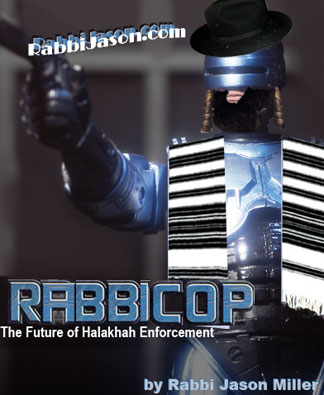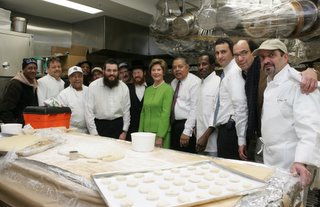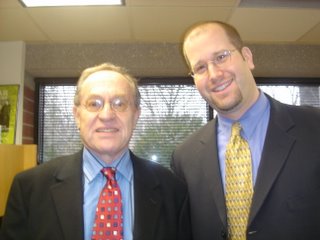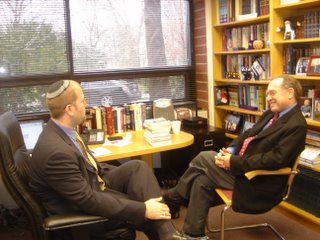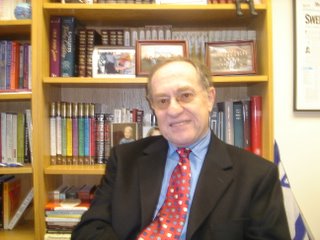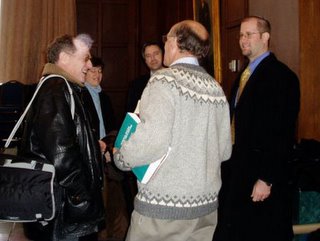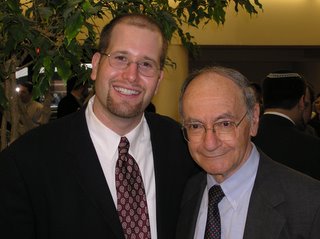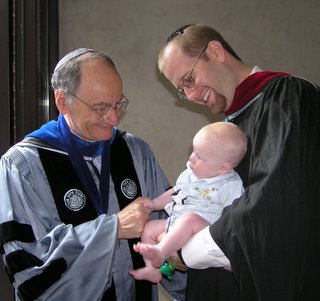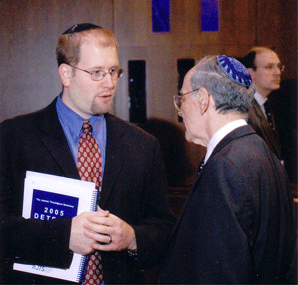From the New York Times
A Happy Hipster Hanukkah
By STEPHANIE ROSENBLOOM
HELLOOOOOOOO Jews!” the M.C. shouted to the 1,000 or so people sipping drinks and jostling elbows in the hazy purple light of Crobar, the Chelsea club, on Sunday evening. Disco balls twinkled. Electric menorahs glowed. In the candlelighted V.I.P. area, people bit into chocolate Hanukkah gelt. From a stage on the dance floor Rachel Dratch of “Saturday Night Live” bemoaned being Jewish at Christmastime, and Triumph the Insult Comic Dog, the foul-mouthed puppet, belted out a joyous rendition of “Shalom Aleichem.” It was not long before people were waving their arms above their heads and lobbing inflatable dreidels through the air like beach balls.
There was a name for this merriment: “A Jewcy Chnukah,” a freewheeling celebration of the holiday produced by Jewcy, a group that brings together young Jews through celebrity-filled events. (Proceeds from Sunday night went to Natan, a philanthropic organization that supports projects that engage young Jews in their religion and heritage.) At the end of the evening, which included performances by the rocker Perry Farrell and the cast of “The 25th Annual Putnam County Spelling Bee,” Jon Steingart, a founder of Jewcy, peered down at the packed dance floor. “This,” he said, “bodes very well.”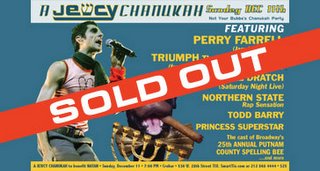
“A Jewcy Chanukah” is but one of many kitschy celebrations that in the past few years have made comedy as much a part of Hanukkah as latkes and sour cream. The irreverent and sometimes R-rated Hanukkah productions, popping up during what many people have called a Jewish hipster moment, are largely a reaction to what many Jews say is an overwhelming amount of Christmas hoopla. Their humor-laden productions attract thousands of young Jews (some of whom have never gravitated toward their own culture before) and, perhaps inadvertently, raise the question of what it means to be Jewish.
“We have 12 months of the year to assert our Jewish identity, so why now?” said Rob Tannenbaum, one half of the variety show “What I Like About Jew.” “The time of year that I feel most like a minority group is Christmas.”
Mr. Tannenbaum said he tries to convey his feelings to his Christian friends by asking them to imagine this: “Everywhere you go strangers say to you, ‘Merry Ramadan.’ Anywhere you go you can’t get into a store because people are bowing to Mecca. You’d be an angry minority. You’d be like, ‘Enough of this Ramadan all ready.’ “
Christmas has gotten out of hand, said Jackie Hoffman, who is starring in “Chanukah at Joe’s Pub,” a one-woman show. “No one does ‘The Sukkot Revue,’ ” she said, referring to the autumnal Jewish holiday, “because then we’re not being badgered.”
Some Jews feel Hanukkah, which begins this year at sundown on Dec. 25, is the perfect time for comic relief because it is not a significant holiday. “We don’t do this with Yom Kippur and Rosh Hashana,” said Joshua Neuman, the editor in chief and publisher of Heeb magazine. “There’s an added comedic value in that we know it is largely the result of American commodity culture.”
Hanukkah is a minor, generally child-centered holiday that celebrates the victory of the Jews over the Syrian Greeks around 165 B.C. No classic Hanukkah films or ballets were inspired by it. There is no “Miracle on Hester Street,” no “Radio City Hanukkah Spectacular.” Jewish songwriters have been more inclined to compose Christmas songs, including many of the most beloved: “White Christmas” (Irving Berlin), “The Christmas Song: Chestnuts Roasting on an Open Fire” (Mel Tormé) and “We Need a Little Christmas” (Jerry Herman), to name but three. Adam Sandler’s 1995 “Hanukkah Song,” in which he enumerates Jewish (and semi-Jewish) celebrities, is the closest thing to a mainstream Hanukkah tune.
“I think Sandler was the catalyst for a lot of this,” said Robert Smigel, the voice (and hand) behind Triumph, after his performance on Sunday. “A lot of that was him asserting himself as a Jew.”
In 1997 the creators of “South Park” mined the potential agony of being a Jewish child during December with the lament, “It’s Hard to be a Jew on Christmas.” By 2003 T-shirts that read “Jewcy” were selling like potato hot cakes, and Jewish hip-hop went from a simmer to a boil. On Monday VH1 will attempt to understand why Judaism is all the rage with a pop culture special called “So Jewtastic.” An excerpt from the show’s press material reads, “In an age when Madonna demands to be called ‘Esther,’ Jon Stewart is a sex symbol and seemingly everyone speaks a little Yiddish, it’s never been hipper to be a Jew.”
Chris Mazzilli, the owner of Gotham Comedy Club, said its annual “A Very Jewish Christmas” is one of its most successful shows. This year he expects about 800 people, up from about 400 last year.
“For us it was a lot easier six years ago,” Mr. Tannenbaum said. “There was a lot less competition on Christmas Eve. It was us or the Matzo Ball. Our only competition was a bunch of pathetic Jewish singles trying to drink enough Manischewitz to forget that they were probably going to be alone on New Year’s Eve.”
This year “What I Like About Jew” will have its largest tour ever, a six-city romp around the East Coast. “Like most other trends,” Mr. Tannenbaum said, “the Jewish holiday hipster started in New York and has spread outward.”
The movement is likely to only go so far, said Rabbi Marc Gellman, part of “The God Squad,” an interfaith cable television show, and a Newsweek.com columnist. “This revival is primarily a New York-L.A. thing, and it’s the result of the fact that the only geographical region that has a majority of Jews outside Israel is Manhattan,” he said. “If you live in Wichita, the new hip Jewish movement will never reach you.”
That these Hanukkah shows tend to be the product of secular Jews also keeps the mood light.
Over the last three years more and more young Jews have been flaunting their heritage, donning T-shirts that proclaim their Semitic roots, listening to the Hasidic reggae singer Matisyahu and climbing onto the celebrity-driven kabbalah bandwagon. And though many occupy the same Lower East Side walk-ups that their grandparents once did, they are not interested in quietly assimilating. They identify more with the cultural trappings of Judaism – the music, the cuisine, the humor – than with the teachings of the Torah.
“We ourselves are less observant Jews, but we are still very culturally Jewish,” Mr. Steingart of Jewcy said. The comedian Rebecca Drysdale is of like mind. “My connection with being Jewish is not a religious one,” she said. “It’s cultural.”
Mr. Neuman explained: “There’s this emerging sense of new Jewish culture that is self-consciously postdenominational and largely devoid of religious context.”
But those who define themselves as “cultural” Jews may alter their definitions over time, Rabbi Gellman said. “When they have kids,” he said, “they’ll say: ‘What do you mean? Of course my kid will have a bar mitzvah.’ ” He also pointed out that while some people call themselves “cultural” Jews, “Judaism defines identity by blood, not by belief.” Translation: If your mother is Jewish, so are you.
“I think they know very little about Judaism, but they seem to be crying out for some identity,” said Ms. Hoffman, who has nine years of yeshiva under her belt. “I don’t know if this generation knows much about Sophie Tucker and Mort Sahl and George Jessel. I think they’re just grasping for something during such an unbelievable onslaught,” she said, referring to the Christmas season. It is good that people are grasping, she explained, but added that taking a Judaism class can be worthwhile. “Investigate before you declare yourself a Jew in name only,” she said. “It’s not so bad.”
Triumph the Insult Comic Dog riffed on that topic on Sunday night. “Jewcy is the bold new movement of cool Jews,” Triumph said, his gravelly voice dripping with sarcasm. “Yeah, we want to be cool. We’re Jews, like the Beasties! We don’t want to be nerdy, like Einstein.” Then he admonished: “Crack open a Torah. Learn something. That’s right! I’m lecturing you bitches!”
The lecture came lovingly gift wrapped in humor, but like many jokes it contained an element of truth. “It’s not just a kitschy subject matter,” Mr. Smigel said later. “It can be reduced to that, and that’s a fear of the older generation. I feel very lucky that I got to get a real education in the religion.”
Some people do not enjoy the new Hanukkah shows. “The older generation is often uncomfortable with our performances,” Mr. Tannenbaum said. “There is a sense that was common in an older generation that you shouldn’t do anything that could be bad for the Jews. Don’t be loud. Don’t be vulgar. Don’t be proud. Blend in. Assimilate. Finish college.”
During the first song in “What I Like About Jew” (one of the milder lyrics is “She puts the whore in hora”), Mr. Tannenbaum said he usually hears “a chair scraping and a pair of orthopedic shoes leaving the room.”
No such exit was made at “A Jewcy Chanukah” on Sunday. After two hours of music and comedy, Perry Farrell mixed the sacred and secular by singing “Avenu Malkenu” and “Jane Says.” Then he curled his string bean body over a microphone and cried, “Happy Hanukkah!” in a voice so joyful, he might as well have shouted, “Happy Christmas to all, and to all a good night.”

